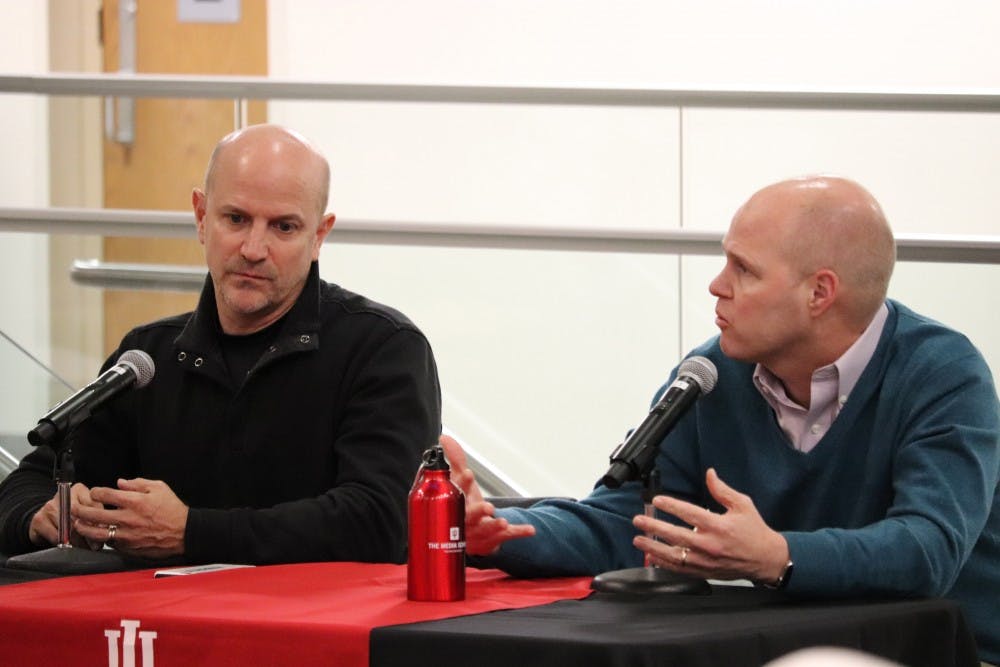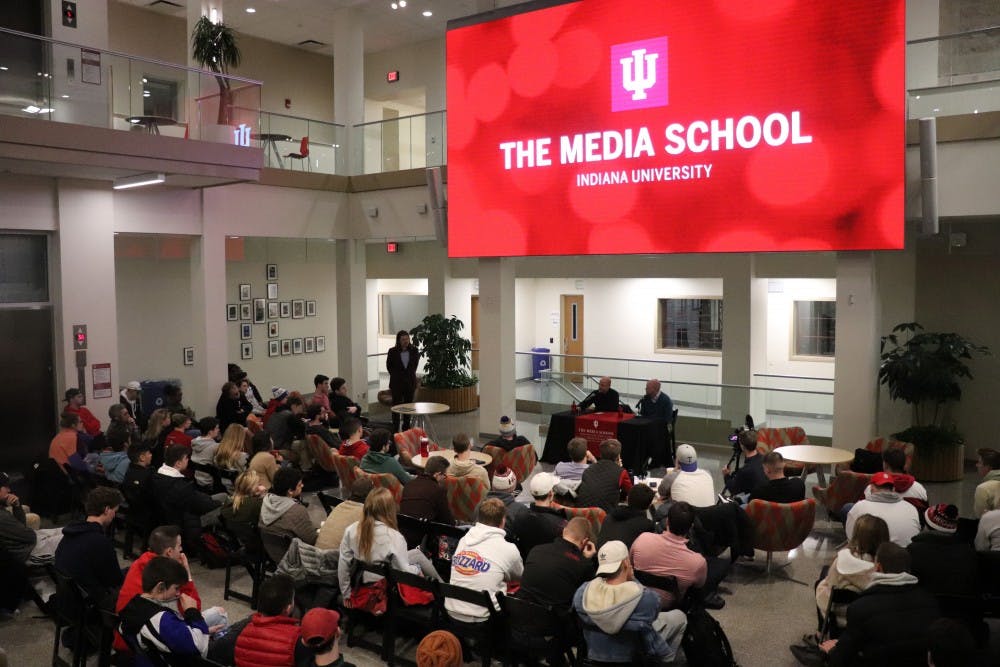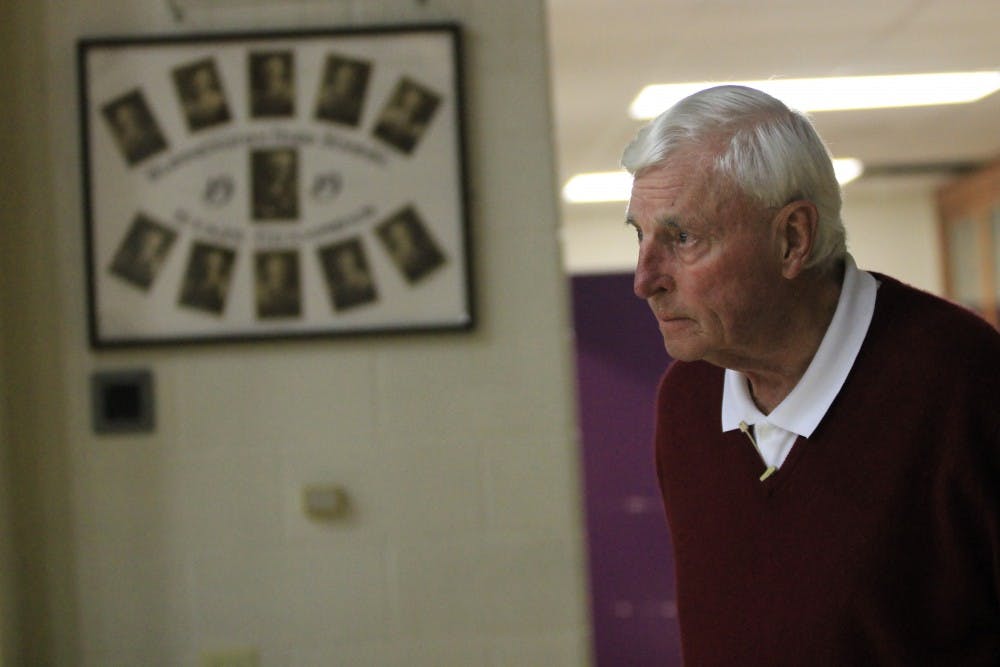For those that really know, it was nothing new.
If you’re a long-time IU men's basketball fan, a part of the younger generation groomed by the mystical stories of Hoosier lore or even just an Indiana native that has been a spectator through the years, Bob Knight’s antics that are replayed in ESPN’s recent 30 for 30 documentary "The Last Days of Knight", which premiered on national television Thursday night, are simply just that — a replay of what you’ve already seen and heard.
One could say buzzwords like "the chair," "the whip" and yes, "the choke," and I’m sure most true Hoosier fans can conjure up visualizations of those iconic moments. You might even chuckle a bit while reminiscing about the heyday of Knight’s theatrics.
But at the Q&A session following a screening of the documentary at Franklin Hall on Monday, director Robert Abbott said something that really stood out and is important in understanding what he was trying to accomplish with the film.
“Knight had qualities that you would wish in every coach and every team in America, but he just had a darker side,” Abbott said. “That’s what the story led me to. This isn’t a biography of Coach Knight.”

"The Last Days of Knight" is not another worn out attempt of a biopic of Knight, and that’s why it’s a major success.
It’s an attempt to humanize the late Neil Reed, who was on the other end of Knight’s choking incident in 1997 and also a bit of closure for Abbott, who was assigned in 1999 to cover the story of three McDonald’s All-Americans leaving Knight’s team over the past few seasons and stumbled into the mess that followed after interviewing Reed for the story.
Abbott accomplished both of those, while also laying out a commentary on the role of journalism and the process of holding those with power accountable for their actions.
Producer John Dahl said he wanted it to be “the 30 for 30 version of 'All the President’s Men.'"
But Abbott ends up achieving something else with the film, and I still can’t figure out if he meant to do it or not.
Knight is still one of the focal characters in the film along with Reed and Abbott himself. Early in the documentary, Abbott lays out why Knight was so revered in the state of Indiana. His system and style of play at IU wasn’t just bringing success to the University, it became the identity of the state and of its people.
No matter what your thoughts on Knight are, that is undeniably an impressive feat.
I totally get it too. I grew up in a small town in southern Indiana, played high school basketball in a system molded around Knight’s ideals of toughness, defense, passing and the motion offense and admittedly grew up a Knight apologist of sorts.
I’m very proud of all of that and always will be. I have wholehearted respect for anybody else that grew up the same way because there are truly positive life skills to take away from Knight’s foundational teachings, making it easier to accept his outbursts through the years.
There’s a part in the documentary that features a soundbite of Knight screaming at his players at the top of his lungs, using the foulest of language to rant about getting beat by Purdue and going 8-10 in the Big Ten. I had seen the YouTube video of that tantrum probably 100 times. While it was on the screen, I turned to my appalled, out-of-state friend, laughed and said “This is a classic.”

I must’ve sounded crazy.
But I didn’t feel crazy at all.
That kind of reaction is important when seeing another video, the one of Knight choking Reed in practice, during the film’s climax.
It’s another video I’ve seen countless times, but I looked it up on YouTube to watch it again after seeing the documentary. I scrolled to the comments section and wasn’t surprised by some of the posts I saw:
“Shows Coach's hand on the kid's jaw in every dad's unmistakable ‘You'd better look me in the eye and listen to me!’ move.”
“That kid was crying about that?? OMG that is nothing. What a crybaby loser. Knight is a legend and the best basketball strategist ever. Reed knew coming into IU he would have to work hard. Everyone hated him because of his bad attitude and zero work ethic. He simply didn't listen to his coaches. Knight barely touched him. My parents were way harder on me than that every single day.”
Every time there was footage in the film of Reed being interviewed during Abbott’s 1999 investigation or of the choking video itself, I’m a bit embarrassed to say there was a small part of me that was thinking thoughts similar to those YouTube comments.
Deep down, I know that’s wrong. The film shows this situation almost ruined Reed’s life, but that kind of perspective of the situation is ingrained in me at this point.
That’s the final accomplishment of Abbott’s film, whether he meant to do it or not.
He makes you self-aware of why we as Hoosiers think the way we do. He makes us step back and take a look at the bigger picture.
Actually, it’s more along the lines of forcing us to step back even farther and look at ourselves and makes us question if we were wrong.
Maybe the Knight apologist in me is still right. I haven’t figured that out yet.
It’s still a piece of me, no matter what.
But I dare you to sit there and watch the clip of Reed squirming and uncomfortably watching the video of himself being choked and say it doesn’t make you question the reaction fit for a traitor he got from fans for what happened.
He’s wasn’t Benedict Arnold. He’s wasn’t Judas.
In the film, Abbott shows Knight’s unwillingness to change brought on his eventual downfall in Bloomington.
But he also shows we haven’t changed much either.




